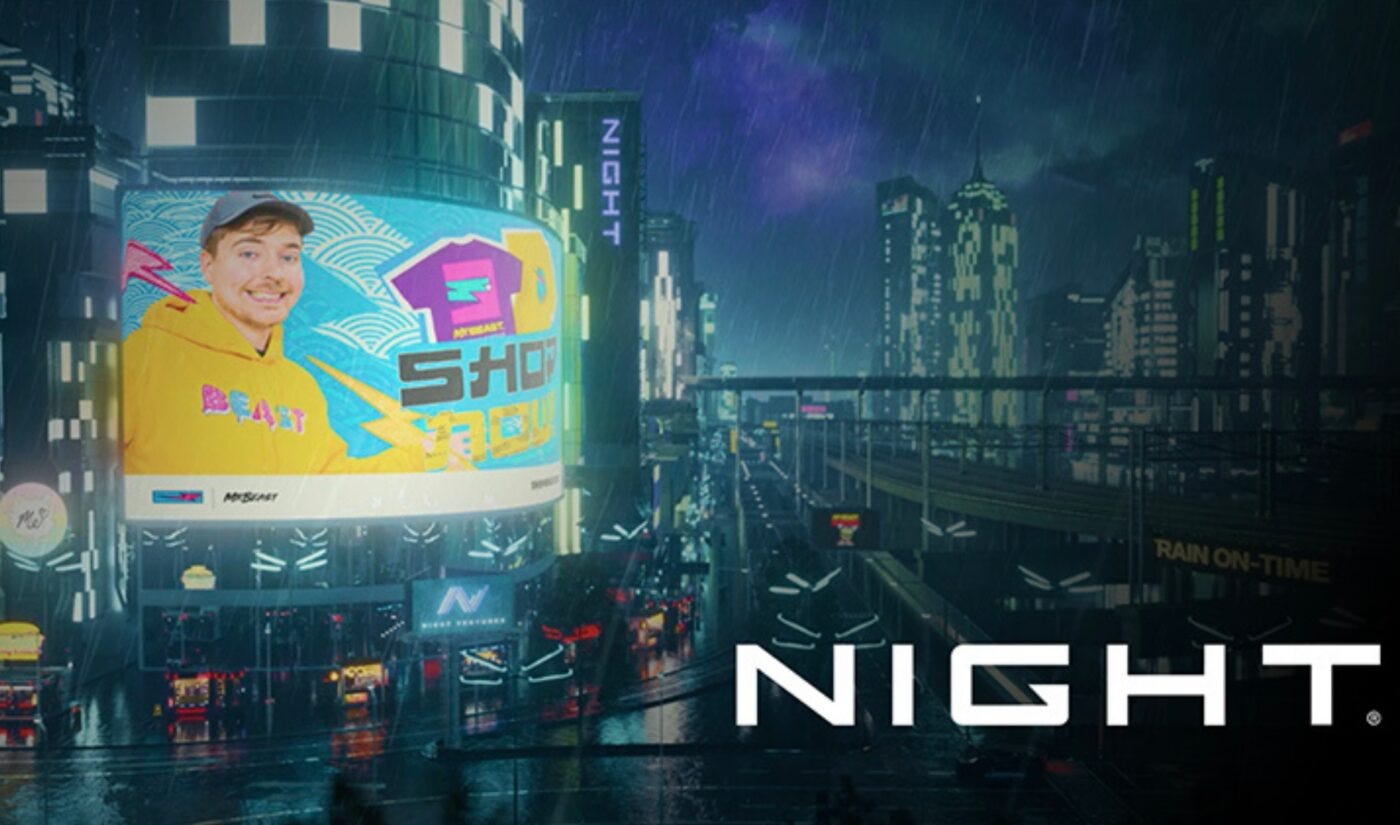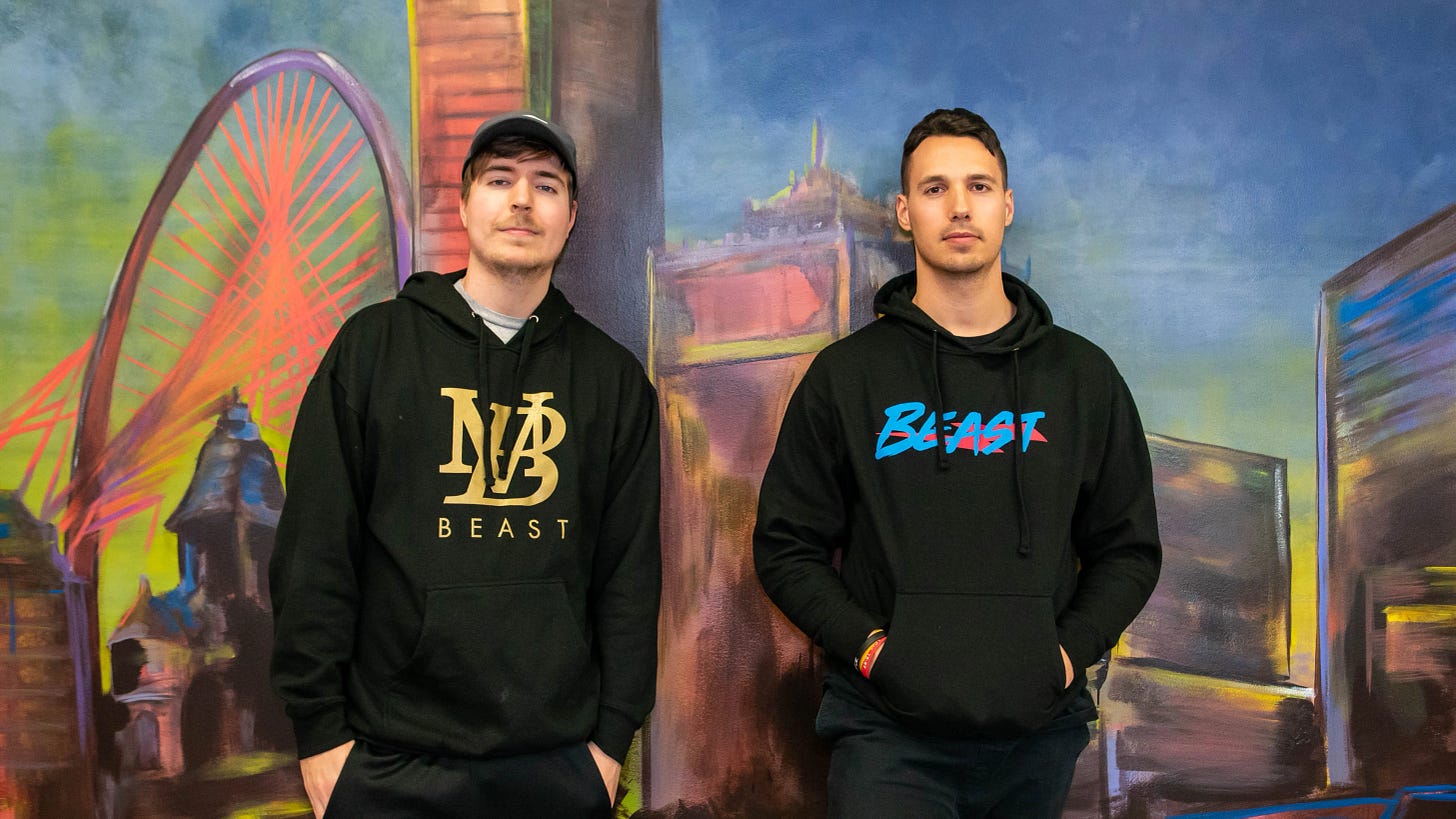If you want to know what a modern media company looks like, start here.
Right now, no one’s doing it better than Reed Duchscher and Night Media. While legacy media scrambles to catch up, Reed is playing 4D chess. He’s not just running a talent management firm—he’s quietly built a next-gen hybrid: part Hollywood studio, part Silicon Valley VC, part creator incubator, part entrepreneurial nerve center.
Reed sees around corners. He tracks shifts in tech and behavior and adapts in real time—like the Oracle in The Matrix, but with spreadsheets and a Discord server. He’s not just managing creators; he’s building the infrastructure for them to become moguls.
Coming from legacy media myself, it’s hard not to feel like a tourist in someone else’s future. But this isn’t about feeling outpaced—it’s about taking the X-ray. And honestly? I love the beginner’s mindset. It makes me nervous. Uncomfortable. That’s where the good stuff lives.
This is about understanding how companies like Night are built, where they’re betting and what lessons we can steal. There’s a white space opening up between the creator economy and Hollywood—and Night Media is mapping it before anyone else.
The irony? The one part of Night that looked most like traditional Hollywood—Night Studios—was the piece that didn’t work. It never quite got traction. After two years of trying to build a premium content pipeline to Netflix and Amazon, they shut it down in 2024. Not everything works. But if you’re going to push boundaries, some bets will fail. That’s how innovation happens.
So if you’re curious how the game is actually played—read on.
Or Reed on, in this case.
Sorry, couldn’t resist. I’m a dad, after all.
The Origin Story: From Football to Feed
Reed didn’t come from YouTube. He came from sports. Inspired by Jerry Maguire, he played D1 football at North Dakota State and later hustled his way into the sports agent business—working with NFL players like Richard Sherman and Odell Beckham Jr. He learned how to cold-call and build something from nothing.
But the ground was shifting. He saw his younger cousins obsessed with Dude Perfect, not Sunday Night Football. He started asking: where is attention going? And more importantly—how do I follow it?
He made the leap in 2014, cold-called Dude Perfect, and pitched himself. Left the NFL world behind, moved to Dallas with almost no money, and started selling brand deals to agencies who barely understood YouTube. One of his first wins? A Callaway Golf deal. He wasn’t their manager yet. He was just the guy bringing value.
Enter MrBeast (and the Real Scale)
In early 2018, Reed was introduced to a guy named Jimmy Donaldson (a.k.a. MrBeast). Jimmy had anywhere from 1.8M to 10M subs depending on the source, but what mattered was his vision. Reed saw it immediately. Jimmy was making weird, sticky content—counting to 100,000, watching It’s Every Day Bro on repeat. It was obsessive. But it was working.
They got to know each other. Reed met his mom. And then he started managing the business—locking down early deals (like Honey), hiring staff, and laying the foundation for what would become a creator empire.
Laying the Foundation: Night Media
Reed officially founded Night Media in July 2015. His first official client was Typical Gamer, followed by Preston Arsement, both in the gaming space. These early clients weren’t just streamers—they were prototypes for Night’s broader strategy: manage talent like businesses. Help them become operators. Push them into entrepreneurship.
By 2020, Night Media had 10 clients and looked like an all-star roster:
MrBeast (Youtube: 382 million | Instagram: 67 millon | X: 32.4 million)
Preston (Youtube: 30 million | Instagram: 2 million | X: 1.8 million)
Brianna (Youtube: 20.8 million | Instagram: 897K | X: 54K)
Unspeakable (Youtube: 8.04 million | Instagram: 1.1 million | X: 156k)
Typical Gamer (Youtube: 15.7 million | Instagram: 782k | X: 1 million)
Crainer (Youtube: 7.8 million | Instagram: 385k | X: 282K)
SSundee (Youtube: 24.8 million | Instagram: 355k | X: 2.4 million)
Mini Ladd (Youtube: 4.42 million | Instagram: 1.1 million | X: 1.3 million)
Samara Redway (Youtube: 1.26 million | Instagram: 259K | X: 216.7K)
Leah Ashe (Youtube: 5.28 million | Instagram: 604K | X: 529.4K)
Collectively, they were doing over 1 billion monthly views with 112+ million followers. Reed called Night the biggest talent management firm in the country—by views, not vanity.
Fast-Forward to 2024
Today, Night Media manages 65+ creators. Some legacy, some new:
Kai Cenat (YouTube: 7.05 million | Instagram: 13.9 million | X: 2.8 million)
Hasan Piker (YouTube: 229K | Instagram: 1.2 million | X: 1.5 million)
ZHC (YouTube: 29 million | Instagram: 3.1 million | X: 251K)
Dream (YouTube: 32 million | Instagram: 2.2 million | X: 2.3 million)
Safiya Nygaard (YouTube: 10.1 million | Instagram: 1.9 million | TikTok: 2.1 million)
Cold Ones (YouTube: 3.12 million | Instagram: 346K | X: 371.9K)
AJ & BIG JUSTICE (Youtube: 269k | Instagram: 539k | X: 41.3k)
Matt Stonie (YouTube: 16.4 million | Instagram: 464K | X: 66.4K)
Carter Sharer (YouTube: 10.8 million | Instagram: 977K | TikTok: 6.2 million)
Azzyland (YouTube: 13.1 million | Instagram: 1.8 million | X: 186.5K)
Reed personally manages only a handful of top-tier clients now. His focus has shifted from day-to-day to strategy, vision, and culture.
The Business Stack: More Than Management
Night isn’t just a management firm anymore. It’s a fully integrated creator company:
1. Talent Management
Traditional rep work—brand deals, partnerships, career strategy.
2. Brand Building
Encouraging creators to think like CEOs. Launching product lines, IP, ventures.
3. Night Labs
An internal venture studio that co-creates businesses with talent. Hits and misses:
Feastables: $10M+ in monthly revenue by late 2023. A rocket.
MrBeast Burger: Exploded out the gate but imploded later—quality issues, lawsuits, exit drama.
4. Night Ventures
A $20M early-stage VC fund launched in 2021. Backed by Night’s creators as LPs. Writes checks up to $300K.
Notable investments:
Beacons, PearPop, Pinata Farms, Creative Juice (Creator tools)
Bitski, Zora, Views (Web3)
Lolli, Yotta, Italic, Public.com (Fintech)
Dorian, Bright Star Studios, 100 Thieves (Gaming)
Alt, Hey Hero, Haus (Consumer)
Results are mixed so far, but Lolli and PearPop have shown growth, and Feastables is the crown jewel.
5. Night Capital
A $100M joint venture with The Chernin Group (launched 2022). Goal: buy controlling stakes in consumer brands and grow them through creator partnerships.
First major move? The Roost Podcast Network—home to Theo Von, H3, Philip DeFranco, and others. 350M views and 20M audio downloads monthly.
The Structure: How It All Connects
Night Inc. – The umbrella company
Night Media – Talent management (65+ creators, led by President Ezra Cooperstein)
Night Ventures – Seed VC fund (GPs: Reed, Ezra, Ben Mathews)
Night Capital – JV with The Chernin Group (Board: Reed, Mike Kerns, Alexandra Moore)
Night Labs – Incubator for creator-led brands
The Roost – Podcast network acquired in 2024
LFM Management – Acquired in 2023 (Kai Cenat and others)
Each piece supports the others. This isn’t a collection of side hustles—it’s a flywheel. Creators drive brand equity. Those brands fuel investments. The company captures IP. The capital grows it all.
AFTER MR. BEAST
MrBeast took more control of his empire in 2024. That should’ve rocked Night Media. It didn’t.
Because Night isn’t a talent agency—it’s a machine.
Reed Duchscher is doing what legacy media still hasn’t figured out: treating creators like CEOs, not content farms.
If you’re still using words like “influencer” unironically, you're already behind.
SO, WHAT NOW?
If you’re MACRO, Legendary, A24, or any legacy player with taste, resources, and a real track record—there’s a path here. But you can’t just bolt on a “creator vertical” and hope it works. You need to rethink your structure.
Start where Reed did: with alignment. His success didn’t come from chasing fame—it came from picking creators who had vision and obsession, then building systems around them to scale. That’s the move.
So what do you do? Partner early. Find creators before they’re fully formed empires, but after they’ve proven they can move audiences. Share ownership. Not just IP, but the upside—let them in the room where strategy is set, not just content is made. Build around business models, not just platforms. Reed’s not betting on TikTok or YouTube—he’s betting on people, then helping them spin off products, shows, tools, and companies. Add value without control. Night didn’t need to own MrBeast to help him win. That’s the play—support without suffocating.
Reed’s playbook isn’t about abandoning legacy—it’s about reformatting distribution. It’s about treating creators like studios, and studios like startups.
The white space is wide open.
But you need to stop thinking like a producer and start thinking like a partner.
Did Reed try to break into legacy media too soon? Maybe. We’re now seeing more creators move into that space—Netflix and Amazon are acquiring creator-led content, audiences are proving they’ll show up. So maybe Night Studios was ahead of its time. Or maybe it was a warning: that new media companies don’t need the validation of legacy platforms, and shouldn’t wait around for it.
My gut? In the short term, there’s still real opportunity in playing on those bigger legacy canvases. For creators who want to make high-end, cinematic work, those platforms offer scope, scale, and prestige. But in the long run—as content reaches a kind of singularity, and the last walls between old and new collapse—creators won’t need permission to make "legacy-type" content. They’ll just make it. And they’ll monetize and distribute it however they want—on Patreon, on paid platforms like Jost, on YouTube for free.
The studios that survive won’t be the ones that cling to the old ways. They’ll be the ones that migrate. The ones that build where audiences already live. The ones that play in the white space.
That’s how you survive the shift.
Hell, that’s how you lead it.





This is a model of what ALL talent agencies need to become. True incubators investing in their clients. Everything else is the old way.
These are mini-masterclasses in business model evolution. I thank you, learning so much.